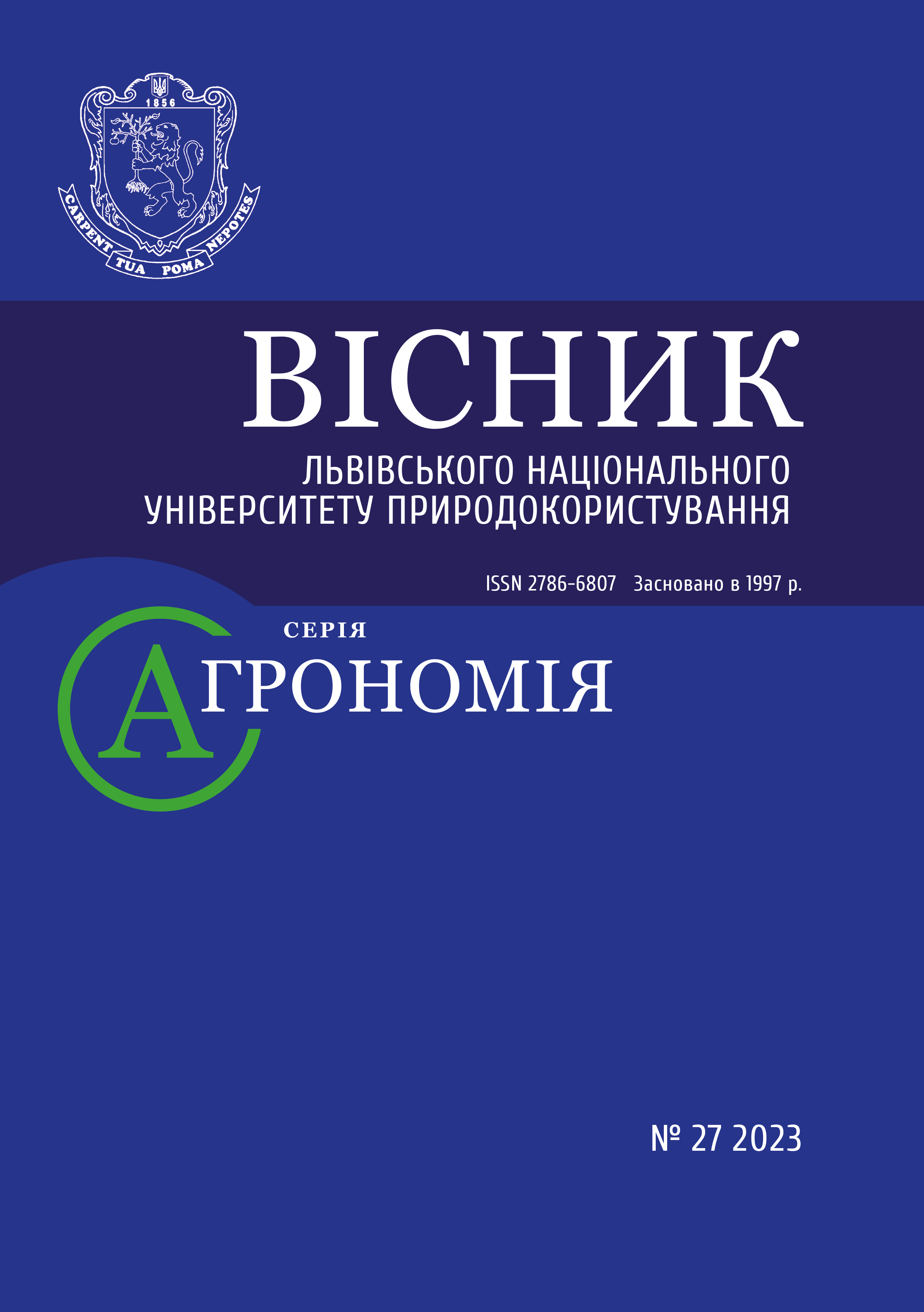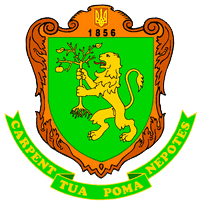EFFECT OF THE SOIL CULTIVATION METHOD ON THE MICROFLORA OF THE TRIFOLIUM PRATENSE AGROCENOSIS
DOI:
https://doi.org/10.31734/agronomy2023.27.068Keywords:
soil cultivation, Trifolium pratense, biological activity, number of microorganisms, productivityAbstract
The work makes analysis of publications on the influence of cultivation method on the number of microorganisms in the soil.
It is found that improving the method of the main cultivation makes it possible to enhance the agrophysical and water properties of the soil, has a positive effect on microbiological processes, provides prerequisites for expanded recovery of fertility and restoration of the natural soil formation in agrocenoses.
The article describes results of the scientific research on the effect of the method of main tillage of Trifolium pratenseagrocenosis on the number of bacteria, fungi, and actinomycetes in the dark gray podzolized soils of the Western Forest Steppe and the yield of Trifolium pratense hay of the Truskavchanka variety. Three variants of the method of soil cultivation were studied, nmely I. Conventional (control) – plowing with a four-cabinet mounted with a body width of 35 cm (PLN-4-35) to a depth of 20–22 cm; II. Chisel – plowing with a chisel plow with a working width of 4.5 m (PCh-4.5) to a depth of 20–22 cm; III. Tiered – plowing with a tiered four-hull plow with a hull width of 40 cm (PYA-4-40) to a depth of 14–16 cm. For the microbiological analysis, the average samples from five individual exemplars were prepared. The main agronomically useful groups of microorganisms were selected from the soil by the method of microbiological sowing of soil extracts on solid nutrient environment: for fungi – wort-agar, for bacteria – meat-peptone agar (MPA), for actinomycetes – starch-ammonia environment.
It is established that development of microorganisms depends on the method of the basic soil cultivation.
The positive effect of tillage on the number of microbiota and yield of Trifolium pretense has been proven. The combined method of the main tillage (plowing with a PYA-4-40 plow) creates the most favorable environment for microorganisms: bacterial microbiota (3621.7 thousand), fungi (45 thousand) and actinomycetes (1640 thousand CFO/1 gram of completely dry soil).
The highest yield of hay (115.6 c/ha) was obtained at the combined method of the main tillage, which provided a significant increase in yield as compared to the control (сonventional plowing) and chisel tillage.
References
Behei S. V., Shuvar I. A. Ecological farming: Textbook Lviv: New World-200, 2007. 429 p.
Demianiuk O. S., Sherstoboieva O. V., Tkach Ye. D. Functional structure of the microbial communities of deep chernozem under the influence of hydrothermal and trophic factors. Journal of microbiology. 2018. Vol. 80. No 6. P. 94–108.
Dospekhov B. A. Methodology of field experiment. Moscow: Agroproizdat, 1985. 351 p.
Dudar I., Shuvar I., Korpita H., Balkovskyi V., Shuvar B., Shuvar A., Kropyvnytskyi R. The Effect of Tillage Method on the Nutrient Regime of Soil during the Growing of Trifolium pratense. Acta Technologica Agriculturae. 2023. Vol. 26, no. 1, P. 29–35. https://doi.org/10.2478/ata-2023-0004.
Fedak L. I. Azotobacter in the agrophytocenosis of winter wheat. Agroecological journal. 2009. No 3. P. 93–94.
Gray T. R., Williams S. T. Soil microorganisms. London, 1987. 550 p.
Harwood C. S., Greenberg E. P. Mega roles of microorganisms. Science. 1999. Vol. 286, No 5442. P. 1096.
Kennedy A. C., Gewin V. L. Soil microbial diversity: Present and future considerations. Soil Sci. 1997. Vol. 162, No 9. P. 607–617.
Krasiuk L. M. Effect of the main tillage and herbicides on the biological activity of gray forest soil. Collection of scientific works of the NSC «Institute of Agriculture of the National Academy of Sciences». 2011. No 2. P. 3–9.
Oades J. M. The role of biology in the formation, stabilization and degradation of soil structure. Geoderma. 1993. No 56. P. 377–400.
Piterson A., Greman D. Biological activity of soil. International Symposium «Structure and Function of Soil Microbiota». 2005. P. 235–236.
Prus L. I. Influence of the agrotechnical measures on the biological activity of the soil, disease resistance and productivity of soybeans. Quarantine and plant protection. 2016. No 7 (238). P. 4–8.
Sendetskyi V. M. Earthworms: scientific basis of cultivation and practical aspects of application: monograph / V. M. Sendetskyi, I. A. Shuvar, N. M. Kolisnyk et al. Ivano-Frankivsk: Symphony Forte, 2015. 444 p.
Shevchenko I. P., Drach Yu. O., Yatsenko S. V. Influence of cultivation methods and fertilizers on the conditions of microbial coenosis and phytotoxic properties of the typical eroded chernozem. Herald of Agrarian Science. 2006. No. 10. P. 12–15.
Shevchenko M. V. Scientific basis of tillage systems in field crop rotations of the left-bank forest-steppe of Ukraine: diss. dr. agr. sciences: specialist 06.01.01. Kharkiv, 2015. 539 p.
Shuvar I. A. Biologization of agriculture on the way to improving the energy system “soil-fertilizer-plant”. Village owner. 2005. No 7–8. P. 23–25.
Shuvar I. A. Clover is a universal meadow culture. Scientific and practical conf. “Farming: yesterday, today, tomorrow”. Lviv, 1993. P. 121–122.
Shuvar I. A. Production and use of organic fertilizers: monograph / I. A. Shuvar, O. M. Bunchak, V. M. Sendetskyi, et al.; In general ed. I. A. Shuvar. Ivano-Frankivsk: Symphony Forte, 2015. 596 p.
Shuvar I. A., Korpita H. M. Effect of herbicides on the intensity of soil microbiological activity in spring barley and potato crops. Foothill and mountain agriculture and animal husbandry. 2016. Issue 60. P. 16–169.
Tanchyk S. P., Yamkovyi V. Yu. Impact of agrotechnical measures on soil biological activity and productivity of winter wheat in the forest-steppe of Ukraine. Scientific bulletin of NUBiP of Ukraine. 2010. No 145. P. 45–49.
Volkohon V. V., Berdnikov O. M., Tokmakova L. M., Larchenko I. V. Development of microorganisms in the rhizosphere of bare oat plants and crop yield under the action of fertilizers and biopreparation microhumin. Herald of Agrarian Science. 2017. No 2. P. 5–10.
Voss M., Sidiras N. Nodulação da soja em plantio direto em comparação com plantio convencional. Pesq. agropec. bras. Brasilia. 1985. Vol. 20. P. 775–782.
Vydynivska O. V. Microbiological conditions of southern chernozem during implementation of the no-till technology. Herald of Agrarian Science of the Black Sea Region. 2013. Issue 2. P. 99–104.


